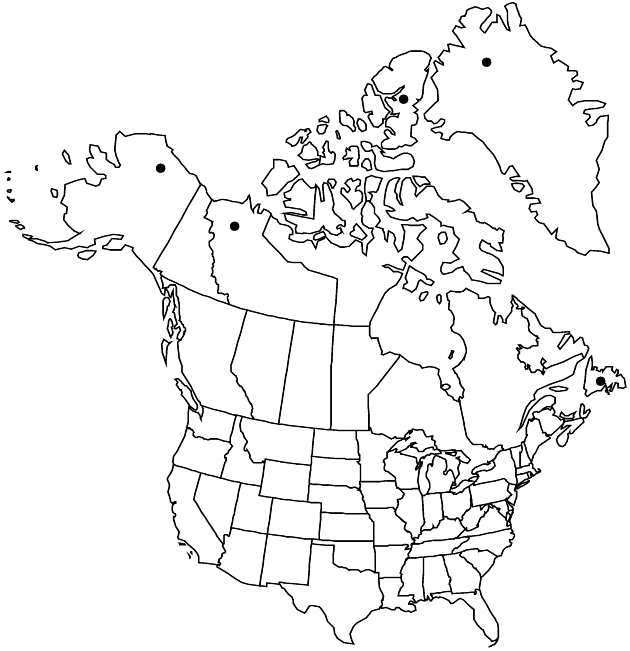Taraxacum phymatocarpum
in G. C. Oeder et al., Fl. Dan. 13(39): 6, plate 2298. 1840.
Plants 2–12(–30) cm (longer in fruit); taproots branched. Stems 1–(2–5), erect to ascending, reddish, glabrous. Leaves fewer than 10, usually horizontal, sometimes patent, rarely erect; petioles slightly winged; blades oblanceolate to linear-oblanceolate (sometimes some nearly runcinate), 1.5–8 × 0.2–0.8(–1.3) cm, bases attenuate, margins usually toothed to denticulate in 1–5 pairs or entire, sometimes shallowly lobed, lobes (and teeth) retrorse or straight, triangular, apices acute to obtuse, faces usually glabrous, sometimes very sparsely villous (mostly along midveins). Calyculi of 8–14, appressed to spreading, later reflexed to revolute, sometimes purplish-tinged, broadly ovate or ovate to lance-ovate bractlets in 2–3 series, 3–5 × 1.8–2.5 mm, margins not or barely scarious, apices usually acuminate, sometimes acute, hornless, tips slightly scarious-erose. Involucres dark to blackish green, narrowly campanulate (urceolate when closed), 9–14 mm. Phyllaries 8–12 in 2 series, oblong-lanceolate or broadly lanceolate to lance-ovate (inner), 1.8–3 mm wide, margins not or narrowly scarious (outer) to widely so in proximal 1/4–1/2, occasionally purplish, apices sometimes callous, hornless, tips scarious, erose. Florets 35–50; corollas pale yellow (sometimes lemon), sometimes drying pinkish (not striped adaxially), outer abaxially gray to purple striped, 10–12 × 2–3.1 mm. Cypselae dark brown, grayish to blackish, bodies oblanceoloid, flattened, (3–)4–4.5 mm, cones conic, 0.5–0.9 mm, beaks stout, (2–)3–5 (3/4+ length of body), ribs 15 (5 prominent), faces proximally at least tuberculate, muricate 1/2–3/4+; pappi creamy or white, 4–5.5(–7.5) mm. 2n = 24, 32, 40.
Phenology: Flowering summer.
Habitat: Slopes to stream banks in tundra, usually dry to drained areas, usually calcareous, rocky taluses, gravel, sand, clay, exposed gravelly-turfy limestone barrens (south)
Elevation: 0–700 m
Distribution

Greenland, Nfld. and Labr. (Nfld.), N.W.T., Nunavut, Alaska, Eurasia.
Discussion
A single disjunct population of Taraxacum phymatocarpum was found by M. L. Fernald and colleagues on Burnt Cape, Northern Peninsula, Newfoundland; otherwise the species is arctic. This diminutive species is characterized by its mostly unlobed leaves, pale yellow ligules, and usually dark cypselae.
Selected References
None.